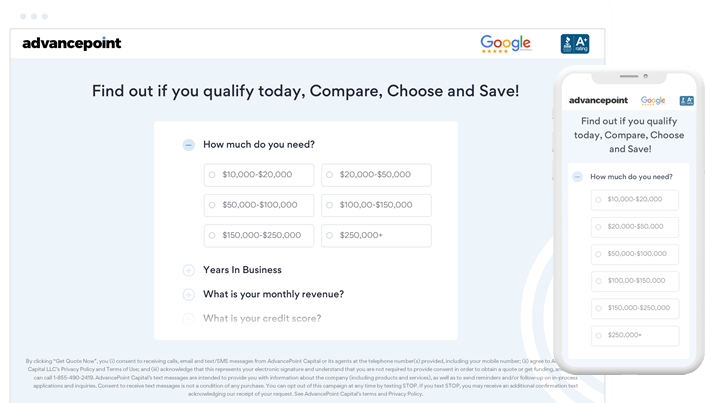Business Loans for Liquor Stores
Liquor stores have a plethora of options, as numerous business lenders view the industry favorably due to its stability and recession-resistant nature. As obvious, the search for the best liquor store inventory financing can be dictated by the intended use, whether it's for inventory procurement, marketing strategies, or general working capital. A range of small business financing options are available to suit these diverse needs, each catering to different aspects of the liquor retail business.
Your qualifications also play an important role in determining the optimal financing solution. Lenders evaluate creditworthiness, business tenure, cash flow, and financial health to decide which products and terms are within your reach. When entertaining the idea of ownership transition, a business acquisition loan could expedite the process of a liquor store acquisition, significantly facilitating entrepreneurial aspirations.
AdvancePoint Capital offers a variety of financing options tailored specifically for liquor retailers. By exploring our marketplace, liquor store owners can tap into the necessary funding without the traditional banking hurdles, making it easier to manage and grow their liquor retail business.
Liquor Store Loans for your Business

Long-Term Business Loan for Liquor Stores
When considering the acquisition of a new property or an existing liquor store, Long-term business loans present an opportunity for entrepreneurs to manage their finances more effectively. Extending the cost over several years yields more manageable payments, especially when delving into the realm of real estate financing or outright buying a lucrative liquor store. Particularly, an SBA 7(a) loan, which can facilitate both acquisitions of businesses and commercial real estate, could be leveraged to achieve your goals of buying or expanding a liquor store, providing ample room for growth with affordable arrangements. Commercial real estate might be required as collateral for substantial loan amounts exceeding $350,000, ensuring a solid plan for leveraging assets towards future success.

Short-Term Small Business Loan for Liquor Stores
A Short term business loan is an option when speed and reduced documentation are needed to receive funds. This is a great alternative when traditional financing is not an option, often assisting in urgent financial needs that may involve inventory purchases or unexpected expenses. While not typically reaching the max loan amount available with long-term financing options, these loans nonetheless offer a timely financial solution. A useful loan for liquor businesses in need of working capital or operating capital.

Business Line of Credit for Liquor Stores
Line of credit is a flexible alternative to traditional liquor store loan types and other forms of small business financing. Liquor stores can draw money off the line up to a credit limit and only pay interest on the outstanding balance. This option is cost-effective and adaptable, offering savings on interest for those who manage to pay it off early.

Small Business Administration [SBA] Loan for Liquor Stores
SBA loans are administered by the Small Business Administration. Although not a direct lender, the SBA sets comprehensive guidelines and offers assurance to institutions providing small business financing, mitigating their risk and encouraging support for entrepreneurs. Particularly beneficial for liquor stores seeking SBA loans are their favorable rates and advantageous repayment terms, which often extend from 4 months up to 2 years, making them an appealing choice for borrowers keen to invest in inventory, real estate, or marketing initiatives. By connecting with our network of SBA lenders, business owners can navigate the intricate process and extensive paperwork to fulfill all of their SBA loan needs with the potential to significantly improve their cash flow.

Merchant Cash Advance (MCA's) for Liquor Stores
A merchant cash advance, also known as business cash advance, is a revenue based alternative to a traditional business loan. MCA's advance money to the business is based on annual revenue. Repayment is made by a fixed percentage of future credit card processing, instead of fixed payments. A great option for operating capital needs.

Business Credit Cards for Liquor Business Owners
Business credit cards are a great supplement to your financing needs for your liquor businesses.

Get Started Today
AdvancePoint Capital makes the loan application process a simple, straightforward experience.

Benefits of Financing Your Liquor Store Business
It Starts with Why Do You Need a Business Loan for your Liquor Store.
There can be many reasons why a liquor store may need money. Establishing the "why" is very important because that can dictate what is the best business financing option to solve that problem or need. Whether it's investing in the business for growth, maintaining the business or solving an immediate problem, business financing can play a vital role solving the "why".
Lets explore the most common reasons why liquor stores need money for the business.
Working Capital
Day-to-day operational expense can add up for a liquor store. Payroll, rent/mortgage payment, liquor/wine/beverage inventory purchases and other unexpected expenses like repairs can really put a pinch on the businesses liquidity and cash flow. Financing for working capital can even out those cash flow short falls.
Business Expansion
The liquor store may need to expand to accommodate more space or perhaps a new location all together may be needed to maintain or increase sales and attract customers. These expansions are costly and in many cases requires business financing to defray the costs.
Inventory
A liquor store lives and breaths on inventory. A liquor store lives and breathes on inventory, crucially including a robust whiskey inventory that caters to connoisseurs and casual drinkers alike. It's essential for the store to be well-stocked with a diverse selection of beer, wines, spirits, and specialty liquors like Fireball Whiskey, so the store can satisfy all customers that walk through the door. Throughout the year, liquor stores—like any well-versed beverage store—can take advantage of various purchasing opportunities such as bulk purchasing and seasonal purchasing linked to in-demand beverages. Business financing can be necessary to take advantage of some of these inventory purchasing opportunities, ensuring that economic conditions don't hinder the availability of popular beverages and spirits.
Renovations
A liquor stores layout and physical location can impact sales. If your liquor store is not inviting and laid out so people enjoy there shopping experience you can lose customers or decrease sales. Renovations can provide a solution to these problems. A renovation can improve store layout and flow, modernizing displays, fixtures and equipment, and provide a better overall experience for the customer which increases sales. Clearly, renovations cost money and access to capital will be necessary.
Point of Sale Systems, Software, and Technology Upgrades
Point of sale (POS) systems play a vital role in tracking sales and inventory. Business owners use these tools to control inventory, monitor sales trends, account for loss all in an effort to be as efficient as possible to maximize profits. New technology and upgrades are common and these systems can be quite costly to upgrade.
Marketing/Advertising
Liquor stores are faced with competition more than ever before and capturing customers attention is very different than in years past. There are a variety of advertising methods to increase awareness, attract customers and engage with them to stand out from the competition. Online visibly is essential in todays world whether it's Google, yelp, trip advisor for awareness or social media like Facebook, Instagram, TikTok to engage with customers, you need as a liquor store to be on top. Also promotional activities and special events assist in building awareness and loyalty. All of these methods cost money and the potential need for financing.
How to Qualify for a Liquor Store Small Business Loan?
Qualifying for financing for the liquor store will require you to meet specific criteria and provide documentation so that underwriters can determine the businesses ability to meet financial suitability requirements and creditworthiness. Lets look at some key metrics that underwriters consider.

1. Credit History:
- Maintain a good personal and business credit score to enhance your chances of loan approval. Better your credit
- Ensure timely payments on existing debts, such as loans or credit cards, to showcase your financial responsibility.

2. Industry Experience/Time in Business:
Demonstrate relevant experience and expertise in the liquor industry to instill confidence in lenders about your ability to successfully run and grow the business.
3. Documentation:
- Gather and organize necessary documents, such as tax returns, bank statements, licenses, permits, lease agreements, and legal documents, to support your loan application.
- Some lenders and programs will require detailed financial statements, including profit and loss statements, balance sheets, and cash flow statements, to provide a clear overview of your liquor store's financial health.
Remember, each lender may have specific requirements and criteria for evaluating loan applications. It's advisable to consult with multiple lenders, compare loan terms and interest rates, and choose the option that best suits your liquor store's financial needs.

Pros and Cons of Business Financing for Liquor Stores
Pro's
- Financing provides access to funds for purchases and pay expenses—something our dedicated pharmacy lending team is well-versed in facilitating for pharmacists looking to grow their practice.
- Provides access to capital for business expansion of a retail store, including acquiring, equipping, or expanding a pharmacy with the savvy use of debt and equity.
- A method to build business credit and can lead to future financing opportunities, which may include strategies for pharmacists to cash-out some equity as they bring on partners to expand their business horizons.
Con's
- Financing adds debt to the balance sheet of a retail store, often including the need to account for the dollar value associated with goodwill, fixtures, and fittings.
- Financing payments add to monthly expenses and can put stress on cash flow, sometimes requiring a detailed review of financial strategies, possibly even examining goodwill loans tailored for retail businesses.
- The risk of overextending the business which creates delinquency and/or default, impairing credit and potentially jeopardizing future borrowing potential, with lenders paying close attention to goodwill valuation during recovery.
What Lenders offer Business Loans to Liquor Stores?
There are a variety of business loan originators that offer business financing, especially tailored to the needs of liquor sales businesses within the United States. The following are a list of the most commonly used financial institutions and originators:
- Banks and Credit Unions- Banks and credit unions offer both business term loans, commercial real estate loans, business lines of credit, and in some cases SBA loans if the bank is an SBA-approved lender. Liquor store owners can leverage refinancing options like SBA 7(a) loans for existing debts to secure better rates and improve cash flow.
- Business Loan Brokers- Business loan brokers, also known as independent sales organizations, represent a diverse range of products including SBA loans, which can be a great asset for refinancing existing business debts under more favorable terms.
- Online Business Lenders- These digital platforms often provide swift access to business loans and/or business lines of credit which can be instrumental for the day-to-day operations or expansion of a liquor store.
- Invoice Finance Companies- Invoice finance companies, also known as Invoice factors, specialize in purchasing invoices, which can be a flexible financing option for improving the liquidity of a liquor store.
- Equipment Financing Companies- Equipment financing companies provide loans and/or leases for new or used equipment purchases where the equipment serves as collateral, potentially offering low interest and long repayment terms that could be advantageous when upgrading a liquor store’s infrastructure.
- Merchant Cash Advance Funders- Merchant cash advance funders offer the sale of future receivables from liquor sales businesses at a discount to the funder, a useful option for those needing immediate capital without the collateral requirements of traditional loans.
How to Apply for a Business Loan for your Retail Store
- Choose a lender (business loan originator) - Select a lender or originator that best matches your qualifications with products, rates, and terms. When considering a business acquisition, ensure to inquire about the loan terms, as acquiring a business without a building may result in a loan term of up to 10 years.
- Take Application - When taking the application, you will need to select products to apply for first, then fill out the appropriate application for the product as well as provide specific documentation such as bank statements or other financial statements depending on the business funding product you are choosing to apply for.
- Receive Offers - Offers should be delivered by term sheet and/or specific State disclosures. Compare offers from multiple originators and consider all aspects of an offer and not just the rates. Remember, the terms of a loan for a business acquisition can influence your decision.
- Select an Offer - Once you have done your homework and compared offers. Notify the lender (originator) of your selection. You will be asked to sign an agreement and provide closing condition documents for final approval and clear to fund once the lender completes all verifications.
- Receive Business Funds - After you are given a clear-to-fund, the repayment process is set up, and your funds are sent to your business bank account. It's crucial to manage these funds wisely, especially when they are aimed at facilitating a business acquisition.



